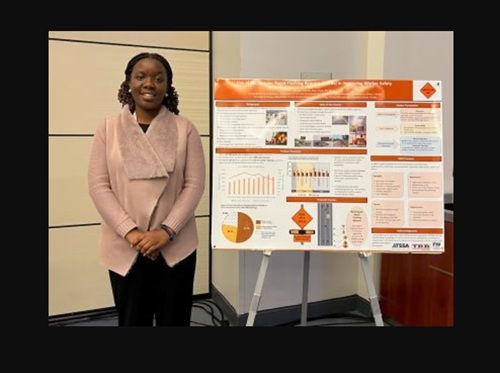The American Traffic Safety Services Association, in partnership with the Transportation Research Board, named winners of its 2025 Traffic Control Device or TCD Student Challenge at TRB’s Annual Meeting this week in Washington, D.C.
[Above photo by ATSSA]
ATSSA said 10 teams, made up primarily of engineering students from universities across the United States, competed in the annual TCD Student Challenge – with the 2025 event entitled, “Innovative Traffic Control Device Solutions to Improve Roadway Worker Safety.”
The three winning teams were chosen during the TRB Annual Meeting, with each winning team receiving a cash prize ($1,500 for first place, $1,000 for second place and $500 for third place) along with the opportunity to present its submissions at ATSSA’s 55th Annual Convention & Traffic Expo in Orlando, FL, Feb. 28-March 4.
The 2025 competition winners are:
- Hellen Shita of Florida International University won first place for the project entitled, “Use of Rectangular Rapid-Flashing Beacons in Improving Worker Safety.”
- Seth Wilder of North Carolina State University placed second with a project entitled, “DrumSense: An Intelligent Platform to Enhance Work Zone Safety and Data Collection.”
- A team from the University of Connecticut placed third with a project entitled, “Multi-Tiered Traffic Control and Safety System for Construction Zones Using Temporary Asphalt Text, Lidar, and Work Zone Intrusion Monitoring.”
“This contest, now in its eighth year, offers students the opportunity to put their years of academic study into practice in a real-world scenario,” said Nagham El-Zine, ATSSA’s manager of innovation & technical services, in a statement.
“These student challenges are designed to help achieve the industry’s goal of eliminating deaths on the nation’s roadways and enable students to make a difference,” El-Zine noted.
The TCD Student Challenge is open to high school, junior college, college and university students or teams of students who have an interest in transportation and an understanding of traffic control devices. Students in relevant fields such as transportation, human factors and technology-related curricula are particularly encouraged to participate.
Entries are judged on the ability of the idea to address the problem, applicability of the idea and its transferability to various environments and roadways, and feasibility of implementation.
 Nation
Nation
The Stream by AASHTO: Electrified Roadway Testing
December 5, 2025 Nation
Nation

